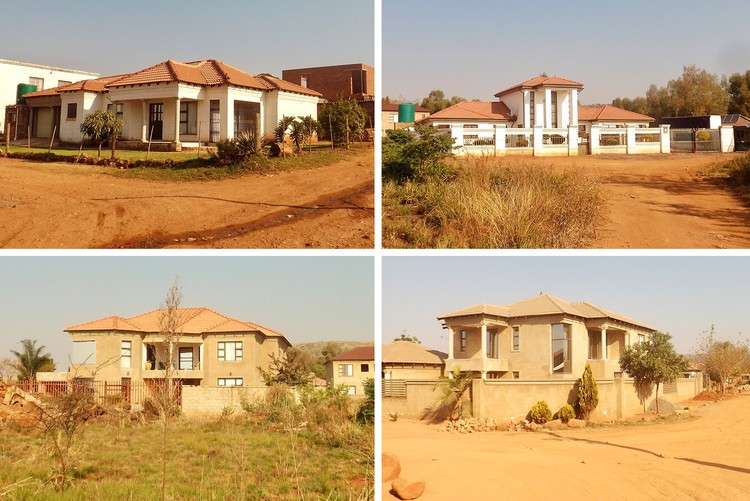City of Tshwane probes illegal suburb
Leeuwfontein has been developed without subdivision or approval by local authorities. Now residents want services
The City of Tshwane is investigating how Leeuwfontein came to be developed. Photos: Warren Mabona
- The City of Tshwane has announced that it has launched an investigation into how Leeuwfontein came to be developed as a residential area.
- Plots have been sold and houses built without plans or City approval.
- Residents of Leeuwfontein are now demanding services and recognition from the City.
- The City says it has no programme to roll out services to such unplanned and illegal developments.
The City of Tshwane has announced that it has launched an investigation into the development of Leeuwfontein, near Mamelodi, east of Pretoria. The City says the suburb sprung up without legal subdivision of the property, rezoning or plans.
The announcement of the investigation follows an article by GroundUp on 9 June after residents complained they were living without any basic services, such as electricity, water, sewage, refuse removal and street maintenance, from the municipality. Residents have improvised these to varying degrees. The gravel roads are deteriorating.
On 28 June, Selby Bokaba, spokesperson for the City, said the City has issued contravention notices to the land owners and the matter has been referred to the City’s legal department.
He said the land owners had subdivided and sold the plots to residents illegally. Bokaba said the land owners in question are Mirror Development Projects Trust (now named Mirror Developers) another obscure company and an individual, both of whom GroundUp has been unable to trace.
Regarding the provision of basic services, Bokaba said, “The City does not have a programme of helping the people who live in stands that they bought illegally. This [illegal subdivision and sale of land] is a criminal offence that needs to be addressed through a proper process.”
Bokaba said such illegal sales were a national challenge.
Residents we spoke to said they bought their properties from Malesela Marema. Marema has confirmed he sold plots through Mirror Developers.
Nenkie Mashowa and Jubilee Mtweni said they bought their plots each for R80,000. They said Marema promised them that there would be development in the area, including basic services such as running water and electricity.
Several residents told GroundUp that they welcomed the City’s investigation and they hoped it would lead to Leeuwfontein being formalised. One of them is Ernest Buthelezi. He built a double-storey house on the plot he bought from Marema in 2019.
“I resigned from my job and used R145,000 of my pension payout to buy this stand in 2019,” said Buthelezi.
Abel Sikatane said he bought his plot from Marema in 2015 for R87,000.
He also used some of his pension payout to buy the stand.
“I then built a house for my family. I’m now disappointed because there are no basic services here. I hope the investigation will make good changes,” said Sikatane.
Neither Buthelezi nor Sikatane received title deeds, despite requests.
Marema told GroundUp that Mirror Developers had applied to the City of Tshwane in 2010 for the establishment of a township and submitted all the requirements in person. He said the City never responded.
“They are not telling the truth. The municipality also wanted to take over the area [Leeuwfontein] in 2022. They asked for the costs and we gave them everything in a report, but they did not come back to us,” he claimed.
We asked him to show us what he had submitted and we made an appointment to see the documents. When we arrived he said his “town planner” had just taken the files. He said he had appointed a town planner to re-apply to the City for the establishment of the township and to formalise Leeuwfontein.
What is not disputed is that the development was done without approval.
Next: Safe Space for homeless people in Green Point one step closer
Previous: Cape Town’s Central Line will be fully operational before the end of March 2024, says PRASA
© 2023 GroundUp. This article is licensed under a Creative Commons Attribution-NoDerivatives 4.0 International License.
You may republish this article, so long as you credit the authors and GroundUp, and do not change the text. Please include a link back to the original article.
We put an invisible pixel in the article so that we can count traffic to republishers. All analytics tools are solely on our servers. We do not give our logs to any third party. Logs are deleted after two weeks. We do not use any IP address identifying information except to count regional traffic. We are solely interested in counting hits, not tracking users. If you republish, please do not delete the invisible pixel.



